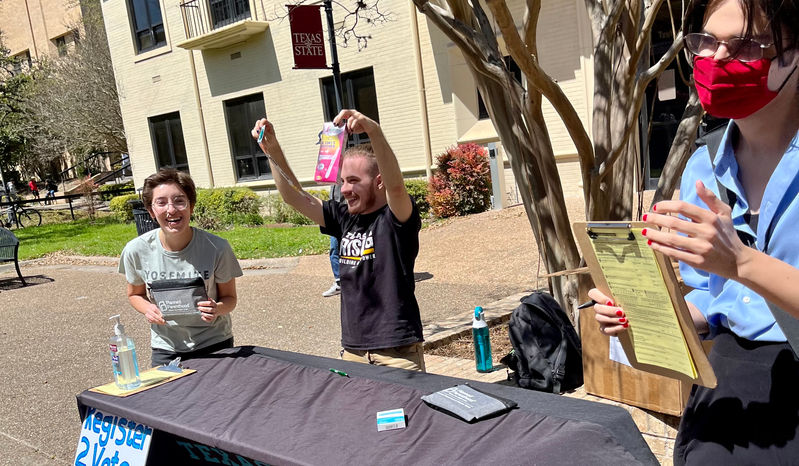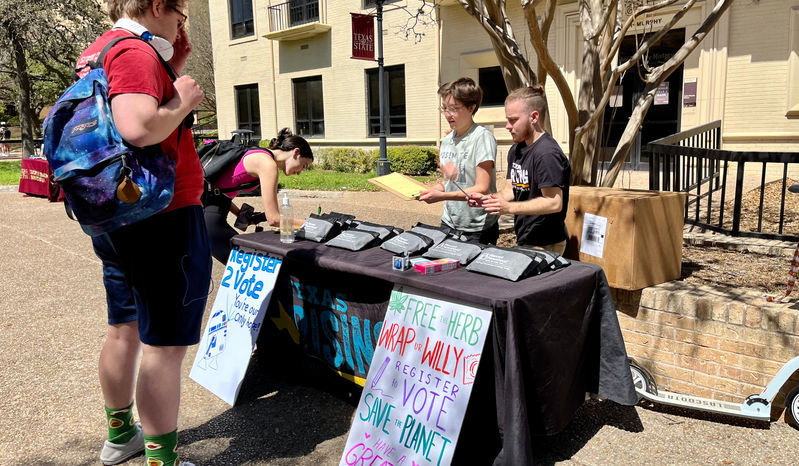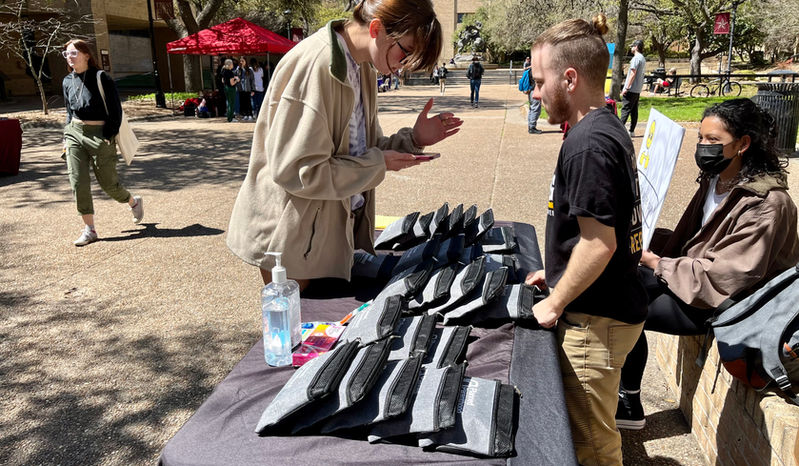The ongoing battle
What Texans and organizations are doing to protect reproduction rights
By Mia Robinson Mianicole14@gmail.com
Published May 4, 2022
The fight to protect reproductive care has been going on in Texas since the 90s and has resurfaced in the public eye after Senate Bill 8 was passed in late 2021. SB8, also known as the Texas Heartbeat Act, prohibits abortion when a heartbeat is detectable, which could be as early as six weeks after conception. This law allows any citizen to sue anyone up to $10,000 who performs or helps a person get an abortion in Texas after that period. On March 11, SB8 was taken to the Texas Supreme Court and was upheld even though many people believe that this bill is unconstitutional under Roe V. Wade. On the evening of May 2, Politico published a copy of the Supreme Court’s draft opinion on the pending case of Dobbs V. Jackson Women's Health Organization showing that the vote would overturn Roe v. Wade.
“For a lot of people, they are already living in a post-Roe world,” AVOW outreach manager Nneka Iheanacho said. “Roe, we like to call the floor, not the ceiling. So just because technically there should be access does not mean that a lot of people will have access to abortions.”
Organizations that protect reproductive rights like AVOW and Fund Texas Choice are working to educate and help people get the care they need.
“Our stance on SB8 is that it's a human rights violation and it's essentially preventing people from seeking the health care that they deserve,” Fund Texas Choice Communications Director Jaylynn Farr Munson said. “Since SB8 went into effect, we've seen a 300 percent increase in the number of people that are calling us for needing support, and we're only able to help about a third to a half of the people that call us.”
The law has already been in effect for eight months and the consequences are being seen nationwide with people from Texas trying to get reproductive care.
“Clinics in neighboring States are seeing exponential increases in the number of people traveling to them to access abortion care,” Policy Director at Power to Decide, Tara Mancini, said. “And in fact, it is not just a bordering state. There was an analysis from Guttmacher Institute. In November 2021, they had done some analysis and they found that Texas residents sought out abortion care in at least twelve states that did not border Texas, going as far away as Washington and Maryland.”
All the states laws around abortion: https://my.visme.co/view/1j96n67m-pmx2vmjmyw6w2qvz
What is being done to help
Organizations online, in person, and ordinary people are helping stop the spread of misinformation on reproductive health as well as where to get it done. Power to Decide is an organization that is a reliable, trustworthy source to get information on reproductive health care.
“One of the sites that we launched is abortionfinder.org which is one sort of service that we provide to make sure that people can find abortion care near them,” Mancini said.
Power to Decide also advocates for increased access to abortion on its website and at the federal level.
“The Women’s Health Protection Act is something that we have vocally supported and then also encouraged our consumers to also reach out to their members of Congress to urge them to co-sponsor in the beginning,” Mancini said. “It passed in the House, but unfortunately it did not have all the numbers in the Senate. We are going to continue to push these things forward.”
Fund Texas Choice came into existence a few years ago to offer practical support to Texans that need to travel outside of the state to get their procedure done.
“Ever since SB8 went into effect it has been more difficult for people to get their abortions done at the handful of clinics in Texas,” Munson said. “We offer practical support assistance like flights, hotel accommodations, gas reimbursement, childcare reimbursement, food, ride share services, and things like that.”
There are also organizations that can be seen advocating for policy changes on college campuses like Texas Rising, which is a nonprofit, nonpartisan organization that encourages young people to be educated on these issues.
“We’re going to be receiving these reproductive care kits, that we’re going to be distributing on campus, which is going to include things like condoms and birth control,” Texas Rising Officer Adrianna Montoya said. “We do meetings about this stuff, and we have noticed that a lot of our members are deeply passionate about reproductive rights.”
AVOW is a Texas-based abortion rights champion working to ensure that every person is trusted, thriving, and free to pursue the life they want.
“A lot of our work does have to do with education and culture shift because we're not actual funders of abortion and we don't provide any financial assistance with abortion,” Iheanacho said. “[We educate] people on what is going on with SB eight, how it is impacting them, [and] where you can still get an abortion. Helping people navigate a lot of that red tape that has been created [by] finding resources like our needabortion.org website.”
Reproductive care for all
There is a common misconception that the reproductive rights issue only affects women, and this sometimes has to do with the language they use in these laws like SB8.
“Besides being against the law itself [SB8], if they start saying that it’s just a bill that’s anti-women then we are leaving out people like me, who are trans, and need those protections in place,” 22-year-old Tegan Debrock said.
Many organizations, like AVOW, are trying to destigmatize this way of thinking by educating the public about how these laws affect other groups of people as well as the language they use.
"A lot of the work we do is shifting the focus on just like centralizing women because reproductive health is an issue, and it is not just a necessarily a woman’s issue,” Iheanacho said. “We do not want to further stigmatize trans men and nonbinary folk who are also in need of care.”
Because of anti-inclusivity when talking about reproductive rights, non-binary and transgender people are sometimes not comfortable with seeking out care because of additional barriers these laws create.
“When it comes to abortion access specifically it has really devastating consequences on nonbinary or transgender people or nongender performing bodies because those types of folks are already typically excluded from maternal health care,” Munson said. “They are not often given the safe spaces and respect that they deserve when seeking healthcare already in traditional spaces and now this new law makes it even harder for them.”
Organizations like Power to Decide, believe that one way to end this stigma around these communities is to tell their stories which they commend Wetestify.org for doing.
“We Testify have abortion storytellers that have been centering on all folks that have abortions but those specifically who are queer, trans, and nonbinary,” Mancini said. “I think the more that those stories get out there, the more that those communities will be able to seek gender-forming care, but it has a significant impact on them from the stories I have heard.”
The Future
Supreme Court case Dobbs V. Jackson Women's Health Organization was presented on December 1, 2021, which defended the right to abortion. This case is monumental because it is the first time the court will rule on the constitutionality of a pre-viability ban since Roe v. Wade and if the court rules a certain way it could overturn Roe v. Wade. It has been confirmed by the Supreme Court that the leaked opinion draft on the Dobbs v. Jackson case was authentic, but it was not the decision of the court. The ruling on the case will be presented in June 2022 and many organizers believe that this might have a detrimental effect on the country because there was talk of overturning Roe and Casey v Planned Parenthood in the leaked document.
“The idea that abortions will cease to exist because Roe is overturned will not be the case,” Iheanacho said. “Instead, there will be more people that end up dying because of not having a clean, safe abortion. I fear for a lot of their lives.”
The lack of safe abortions is not going to be the only thing affected if Roe gets overturned because this leads to many other problems.
“Not having access to abortions can cause a trickle-down effect which will result in more people getting on the WIC program which they keep diminishing funds from,” Campaign Organizer Michelle Kassel said.
Though some states like Alaska, Florida, Illinois, Iowa, Kansas, Minnesota, and Montana have abortion protected in their state constitutions, people are not always able to travel to get their procedures done.
“A crucial point we cannot fail to miss is that the everyday person that we encounter is not going to be able to travel out of state to access their abortion care,” Power to Decide Media Relations Director, Paloma Zuleta, said. “The data shows that when you force a person to have a baby before they are ready it means that the family, the individual, and the individual's mental health suffers.”
There are things that the ordinary person can do if cases get overturned in the supreme court which include donating, protesting, and speaking about abortion with the people in your community.
“I would encourage people to talk about abortions and to have conversations with family, friends, community members in order to make it less taboo,” Munson said. “Donating is very helpful, but if you aren’t in the position to donate, just be willing to spread awareness on social media because you might not know who needs help.”



